The Peace of Callias is a purported peace treaty that supposedly was established around 449 BC between the Delian League and the Achaemenid Empire and ended the Greco-Persian Wars. The peace would then be the first compromise treaty between Achaemenid Persia and a Greek city.

Protagoras is a dialogue by Plato. The traditional subtitle is "or the Sophists". The main argument is between Socrates and the elderly Protagoras, a celebrated sophist and philosopher. The discussion takes place at the home of Callias, who is host to Protagoras while he is in town, and concerns the nature of sophists, the unity and the teachability of virtue. A total of twenty-one people are named as present.
Callias was an Ancient Greek statesman, soldier and diplomat active in 5th century BC. He is commonly known as Callias II to distinguish him from his grandfather, Callias I, and from his grandson, Callias III, who apparently squandered the family's fortune.
Hipponicus III was an Athenian military commander. He was the son of Callias II of the deme Alopece and Elpinice of Laciadae. He was known as the "richest man in Greece".
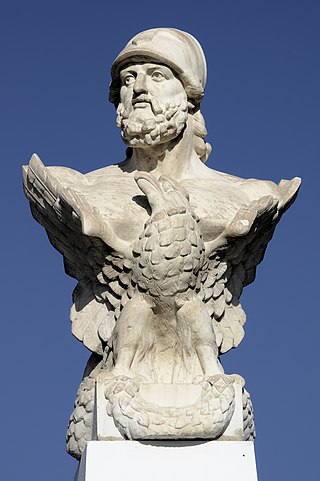
Cimon or Kimon was an Athenian strategos and politician.
Callias was an ancient Athenian aristocrat and political figure. He was the son of Hipponicus and an unnamed woman, an Alcmaeonid and the third member of one of the most distinguished Athenian families to bear the name of Callias. He was regarded as infamous for his extravagance and profligacy.
Callias of Chalcis, son of Mnesarchus, together with his brother Taurosthenes, succeeded his father as tyrants of Chalcis. Callias formed an alliance with Philip of Macedon against Plutarch, tyrant of Eretria, with the view of extending his authority over the whole of Euboea, a design which, according to Aeschines, he disguised as a plan for uniting in one league the states of the island and establishing a general Euboean congress based at Chalcis.

Aeschines of Sphettus or Aeschines Socraticus, son of Lysanias, of the deme Sphettus of Athens, was a philosopher who in his youth was a follower of Socrates. Historians call him Aeschines Socraticus—"the Socratic Aeschines"—to distinguish him from the more historically influential Athenian orator also named Aeschines. His name is sometimes but now rarely written as Aischines or Æschines.

Charlie Callas was an American actor and comedian. He was most commonly known for his work with Mel Brooks, Jerry Lewis, and Dean Martin, and his many stand-up appearances on television talk shows in the 1970s. He was also known for his role as Malcolm Argos, the restaurant owner and former con man, on the Eddie Albert and Robert Wagner television series Switch (1975–1978). Callas was also known as the voice of Elliott the Dragon in Disney's live-action/animated musical film Pete's Dragon (1977).

Erebia is a Holarctic genus of brush-footed butterflies, family Nymphalidae. Most of the about 90–100 species are dark brown or black in color, with reddish-brown to orange or more rarely yellowish wing blotches or bands. These usually bear black spots within, which sometimes have white center spots.
Callias, sometimes called by the nickname Schoenion (Σχοινίων), was a poet of the Old Comedy, not to be confused with the three Athenian aristocrats named Callias, the last of which, Callias III, appears in Plato's Protagoras.
Hermogenes was an ancient Athenian philosopher best remembered as a close friend of Socrates as depicted by Plato and Xenophon.
Callias was the head of a wealthy Athenian family.
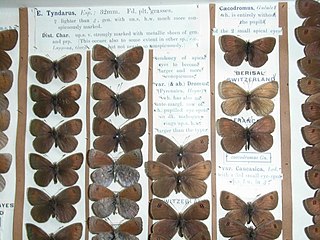
The brassy ringlets are a species group of ringlet butterflies in the genus Erebia. Though closely related, their monophyly is not completely resolved. Still, the brassy ringlets are taxa similar to E. tyndarus – the Swiss brassy ringlet –, and in many cases certainly close relatives. A notable trait of their genus is an ability to adapt well to cold and somewhat arid habitat, like taiga or regions with alpine climate. Optimal habitat in Eurasia, where most of the brassy ringlets are found, therefore occurs in two distinct belts – in the very north of the continent and in the Alpide belt – in interglacials, and in glacials in one periglacialic belt at lower altitude, in places interrupted by dry wasteland and deserts.
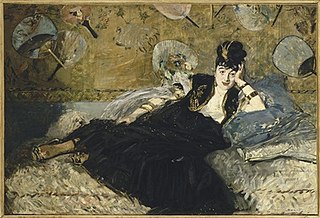
Anne-Marie Gaillard, known as Nina de Villard de Callias, Nina de Callias or Nina de Villard, was a French composer, pianist, writer, and salon hostess.

Erebia callias, the Colorado alpine, is a member of the Satyridae subfamily of the Nymphalidae butterflies. It is found in alpine areas of Wyoming and Colorado in the U.S. Rocky Mountains as well as various mountain ranges in eastern Asia.
Callia is a genus of longhorn beetles of the subfamily Lamiinae.
Callia axillaris is a species of beetle in the family Cerambycidae. It was described by Dalman in 1823. It is known from Brazil.
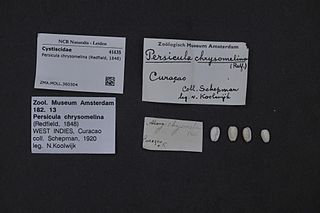
Persicula chrysomelina is a species of sea snail, a marine gastropod mollusk, in the family Cystiscidae.
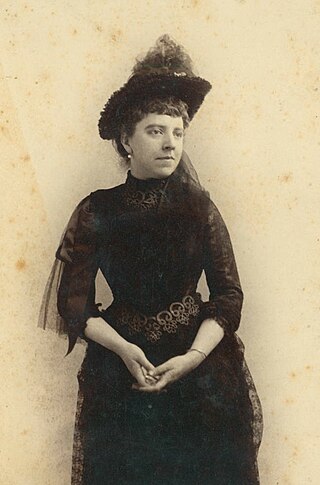
Nancy Fish Barnum Callias D'Orengiani, Baroness was an English socialite, daughter of a successful cotton miller and the second wife of P. T. Barnum, 40 years her senior. After the death of Barnum's first wife in 1873, they married the following year in both London and New York City. After his death in 1891, he left her a large annuity.









